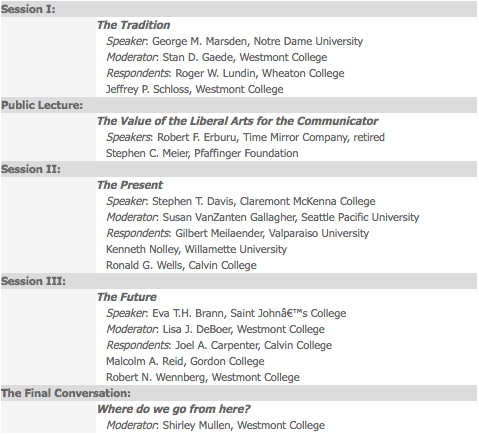In the winter of 2001, the Institute for the Liberal Arts held its first Conversation on the Liberal Arts, a two-day conference held January 19th and 20th. The conference brought together distinguished scholars and members of the broader society from around the country to discuss the state of the liberal arts at the dawn of the new millennium.
Participants took part in three sessions focussing on the past, present and future of the liberal arts. Historian George Marsden of Notre Dame University led off the first session discussing the liberal arts tradition in America. His comments made clear that the liberal arts tradition in America has been one that has continually transformed itself to face the changing needs of American society.
Philosopher Steven Davis of Claremont McKenna College began the discussion of the current state of the liberal arts. He noted that a basic aim of a liberal arts education is to offer the student a coherent outlook on life, and that a Christian college is particularly well suited to this task. Some found this conclusion controversial, but it spurred fruitful discussion about the basic aims of a liberal arts education.
The final session was led by Eva Brann of St. John's College. She offered a vision of the future of the liberal arts that focussed on preserving tradition, provoking much discussion about what tradition or traditions should be represented in a liberal arts education as well as whether the pursuit of new knowledge has a place in such an education.
The conference also included a public lecture given jointly by Robert Erburu, former chairman of Times Mirror Company and Stephen Meier, director of the Pfaffinger Foundation. Erburu and Meier stressed the value in the professional world of the skills and values fostered by a liberal arts education. They encouraged liberal arts colleges to maintain their distinctiveness, insisting that by offering a communal learning environment, an integrative approach to education, and a commitment to their students' character development, liberal arts colleges play a crucial role in American higher education.
By the end of the conference, the only regret was that there hadn't been more time to discuss the issues raised, and the many others that might have been. Our conversation felt like it was just a beginning. Indeed we trust that it will be just a beginning, and that Westmont will become a place where dialogue about the fundamental questions and challenges that face the liberal arts can continue.
Liberal Arts: The Tradition
- The Rise and Decline of the Modern Liberal Arts Ideal in the U.S.A.
George Marsden, Francis A. McAnaney Professor of History, University of Notre Dame - Response to George Marsden
Roger Lundin, Clyde S. Kilby Professor of English, Wheaton College
Liberal Arts: The Present
- Eight Hundred Years of University Learning: Two Pictures of the Liberal Arts
Stephen T. Davis, Professor of Philosophy and Religion, Claremont McKenna College - Some Caveats about Character: A Response to Stephen Davis
Gilbert Meilaender, Professor of Theology, Valparaiso University - The Present of the Liberal Arts: A Response to Stephen Davis
Kenneth Nolley, Professor of English and Interim Dean of the College of Liberal Arts, Willamette University - Response to Stephen Davis
Ronald A. Wells, Professor of History, Calvin College - A Second Look at University Learning: A Response to Professors Meilaender, Nolley, and Wells
Stephen T. Davis
Liberal Arts: The Future
- Liberal Arts: the Future
Eva T. H. Brann, Tutor and former Dean, St. John's College - Response to Eva Brann
Joel Carpenter, Provost, Calvin College - Response to Eva Brann
Robert Wennberg, Professor of Philosophy, Westmont College
The Value of the Liberal Arts for the Communicator
- Character and Community
Robert F. Erburu, former Chairman of the Times-Mirror Corporation and Stephen C. Meier, Director of the Pfaffinger Foundation


